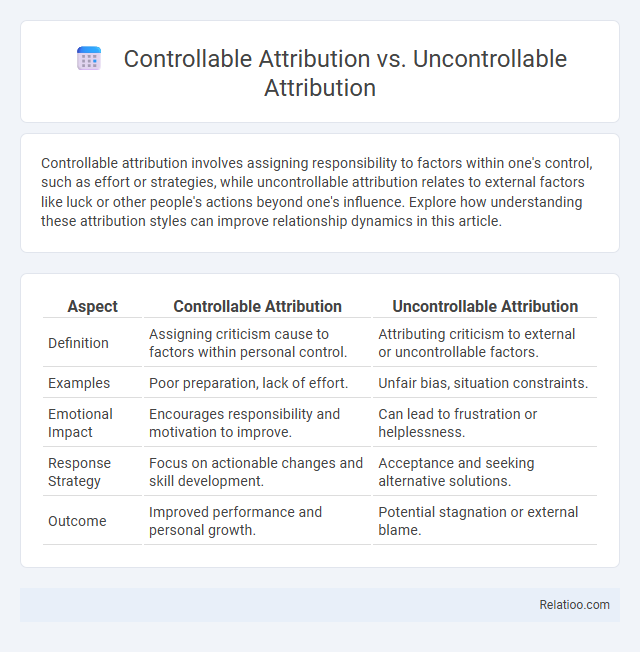Controllable attribution involves assigning responsibility to factors within one's control, such as effort or strategies, while uncontrollable attribution relates to external factors like luck or other people's actions beyond one's influence. Explore how understanding these attribution styles can improve relationship dynamics in this article.
Table of Comparison
| Aspect | Controllable Attribution | Uncontrollable Attribution |
|---|---|---|
| Definition | Assigning criticism cause to factors within personal control. | Attributing criticism to external or uncontrollable factors. |
| Examples | Poor preparation, lack of effort. | Unfair bias, situation constraints. |
| Emotional Impact | Encourages responsibility and motivation to improve. | Can lead to frustration or helplessness. |
| Response Strategy | Focus on actionable changes and skill development. | Acceptance and seeking alternative solutions. |
| Outcome | Improved performance and personal growth. | Potential stagnation or external blame. |
Introduction to Attribution Theory
Attribution theory explores how individuals interpret causes of behavior and events, distinguishing between controllable and uncontrollable attributions. Controllable attribution assigns responsibility to factors within an individual's power, such as effort or choices, while uncontrollable attribution attributes outcomes to external forces like luck or innate ability. Understanding these distinctions helps explain motivation, accountability, and emotional responses in social and psychological contexts.
Defining Controllable Attribution
Controllable attribution refers to the ability to assign the causes of events or behaviors to factors within your personal control, such as effort or strategy. This contrasts with uncontrollable attribution, where outcomes are linked to external or fixed factors like luck or innate ability. Understanding controllable attribution empowers you to take responsibility for actions and motivates proactive behavior.
Understanding Uncontrollable Attribution
Understanding uncontrollable attribution involves recognizing factors that individuals perceive as outside their influence, such as luck, fate, or external circumstances. This type contrasts with controllable attribution, where outcomes are attributed to factors within one's control, like effort or strategy, affecting motivation and behavior differently. Mastery of uncontrollable attribution aids in coping with unexpected events by shifting focus away from blame and fostering acceptance.
Key Differences Between Controllable and Uncontrollable Attribution
Controllable attribution refers to assigning the cause of an outcome to factors within an individual's control, such as effort or strategy, while uncontrollable attribution attributes outcomes to external elements like luck or task difficulty. The key difference lies in perceived control, where controllable attributions empower individuals to modify behavior to influence future results, whereas uncontrollable attributions relate to forces beyond personal influence, often resulting in passive acceptance. Understanding this distinction is crucial for motivation and behavior change in psychological frameworks of attribution theory.
Psychological Impact of Attribution Types
Controllable attribution assigns responsibility for outcomes to factors within one's influence, boosting motivation and promoting proactive problem-solving, while uncontrollable attribution links outcomes to external forces, often leading to feelings of helplessness and reduced effort. The psychological impact varies as controllable attributions foster resilience and greater self-efficacy, whereas uncontrollable attributions can increase anxiety and decrease coping strategies. Understanding these distinctions in attribution types helps tailor interventions to improve mental health and performance by empowering individuals to focus on changeable causes.
Real-Life Examples of Controllable Attribution
Controllable attribution refers to when individuals attribute outcomes to factors within their control, such as effort or strategy, enhancing motivation and responsibility. For example, a student who improves their test scores by studying harder demonstrates controllable attribution, as the success is linked to their own effort. In contrast, uncontrollable attribution assigns outcomes to external factors like luck or task difficulty, often reducing personal accountability.
Real-Life Examples of Uncontrollable Attribution
Attribution theory distinguishes between controllable attribution, where individuals perceive outcomes as influenced by factors under their control, and uncontrollable attribution, which assigns outcomes to external forces beyond personal influence. Real-life examples of uncontrollable attribution include natural disasters impacting a community's economic stability, sudden illness affecting an individual's ability to work, and unexpected traffic accidents delaying important commitments. These examples highlight how uncontrollable attributions shape human behavior and emotional responses by attributing causes to uncontrollable external circumstances.
Attribution and Personal Motivation
Attribution refers to the process by which individuals explain the causes of their own behavior and events, significantly influencing personal motivation. Controllable attribution assigns outcomes to factors within one's control, such as effort or strategy, enhancing motivation by fostering a sense of agency. Uncontrollable attribution attributes outcomes to external forces like luck or task difficulty, often diminishing motivation due to perceived lack of influence over results.
Implications in Education and Workplace Settings
Controllable attribution, which assigns outcomes to factors within an individual's control such as effort or strategies, fosters motivation and resilience in educational and workplace settings by encouraging proactive behavior and self-improvement. Uncontrollable attribution, attributing results to external forces like luck or innate ability, often leads to helplessness, reduced effort, and lower persistence when facing challenges. Understanding these attribution types enhances interventions to improve performance and well-being by promoting adaptive attribution styles that support responsibility and growth mindset development.
Strategies to Foster Healthy Attribution Styles
Strategies to foster healthy attribution styles include encouraging a balanced perspective by teaching individuals to recognize controllable factors in their successes and failures, which promotes personal responsibility and motivation. Cognitive-behavioral techniques help shift uncontrollable attributions toward more adaptive explanations, reducing feelings of helplessness and enhancing emotional resilience. Regular reflection and feedback can cultivate awareness of attribution patterns, enabling the development of constructive thinking that supports psychological well-being and effective problem-solving.

Infographic: Controllable Attribution vs Uncontrollable Attribution
 relatioo.com
relatioo.com